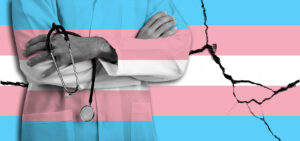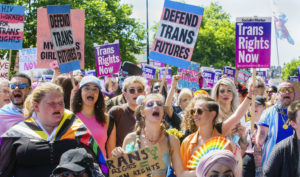As we move into the festive season, some unexpected joyful tidings: the UK’s foremost LGBT charity has finally discovered the importance of independence from government. This week, it was reported that Stonewall has successfully persuaded the UN-partnered Global Alliance of National Human Rights Institutions (GANHRI) to launch a special review into the UK’s Equality and Human Rights Commission. The EHRC stands accused of insufficient critical distance from the Conservative Party, with the result that it has allegedly become “unfair” to trans people. At risk is its current “A” status accreditation, retraction of which would entail a loss of voting rights at the UN Human Rights Council and other associated punishments.
In pursuing this outcome, Stonewall has resurrected a set of complaints about the equality watchdog that it first co-authored with Jolyon Maugham’s Good Law Project and sent to GANHRI last year. In a lawyer’s letter also made public at the time, the two organisations claimed that there had been various murky political appointments of EHRC Commissioners “broadly supportive” of government, which had then produced a lack of “pluralism” in the organisation. As a result of these and other perceived infractions, it was claimed that the EHRC now insufficiently complied with the Paris Principles, first formulated in 1993 and described by GANHRI as the “minimum standards” a national human rights organisation must meet “in order to be considered credible and to operate effectively”.
This first attempt at forcing a special review failed; but this week it emerged that, in May, along with 29 other transactivist organisations, Stonewall once again complained to GANHRI and this time succeeded. The new ingredient appeared to be an explicit allegation that the EHRC’s recent attempts to make some women-only spaces genuinely single-sex — disingenuously described by Stonewall as seeking “to enable greater exclusion of trans women” — are “actively harming trans people”. Like thousands of organisations and individuals before them, when faced with the magic words “exclusion” and “trans women” in some combination, GANHRI appears to have succumbed immediately, without much reflection on why physical exclusion of males from a place where women undress, sleep, or play sport might be perfectly justified.
Stonewall bosses are probably now wondering why they didn’t cut to the chase sooner. Certainly, you don’t have to be Sherlock Holmes to work out that their pique at the EHRC’s rejection of the transactivist position on single-sex spaces was the reason behind such superficially high-minded interventions all along. If they really cared about the upholding of the Paris Principles and the knock-on effects for the rights of LGBT people, one assumes they might also have had something critical to say about the fact that GANHRI has awarded coveted A-list status to such homosexual havens as Qatar (where gay sex is illegal, and potentially a capital offence); Indonesia (where gay sex is illegal under Sharia law in one province, and frowned upon everywhere else); and Egypt (where gay sex is de facto criminalised under morality laws).
Instead, GANHRI is now operating psychically for Stonewall as the latest saintly supranational authority figure to be appealed to without question; no doubt pictured by its employees as standing shoulder-to-shoulder beside them in their ongoing battle with whichever nasty bigoted haters are currently standing in the organisation’s way. And this is quite amusing — because historically, Stonewall used to think of both the Conservative government and the EHRC as playing precisely that authority figure role for them at a national level. In fact, when it comes to cheek-by-jowl relationships between human rights organisations and UK government, Stonewall wrote the playbook.
This, after all, is the organisation that became accustomed to seeing Home Secretaries speak at its award ceremonies; ministers and committee chairs mindlessly parroting its campaign objectives; and government departments vying for top spot in its Workplace awards scheme. In that light, then, we should read Stonewall’s complaint to GANHRI not so much as motivated by a genuine concern for liberal neutrality in human rights organisations, but more like the vengeful retribution of a jilted lover, trying to cause problems for an ex’s new relationship by complaining vociferously to the ex’s mum.
This charity didn’t seem to care about the close relationship between the UK government and the EHRC as long as it was able to give orders to both. For a good while, it seems that it had the run of the EHRC in particular. The chair of that organisation from 2016-2020 was David Isaac, a former chair of Stonewall appointed by Conservative minister Nicky Morgan. This was an appointment criticised at the time for the fact that Isaac’s law firm Pinsent Masons was the recipient of millions of pounds worth of contracts from the government, thereby potentially reducing the EHRC’s ability to hold them to account. It is also clear from FOI requests that the relationship between Stonewall and the EHRC both during and after Isaac’s tenure was extremely chummy, with Stonewall assuming they could review EHRC documents before publication and instructing its office-holders to officially adopt their policy on self-ID. The EHRC was also a Stonewall Diversity Champion until 2021, which in practice means that it would have received every piece of campaign propaganda going, with the usual expectation that it would all be effortlessly ingested and then regurgitated.
In sum: for Stonewall to have the effrontery to complain to GANHRI about a “lack of political independence” demonstrates as much brass neck as you would expect from the very same organisation that, in 2022, petulantly withdrew at the last minute from partnering the Government in a major international conference on global LGBT human rights — thereby ensuring that the conference, and any resultant progress, could not happen at all — simply because the Government would not endorse their preferred stance on criminalising talking therapy for gender-confused teens. As is so often the case, Stonewall officials have apparently redefined a familiar phrase to mean its exact opposite. In future, when they complain about a lack of political independence, the reader should probably understand that the institution in question has finally found the balls to become politically independent from them.
And it also seems that Stonewall bosses have an idiosyncratic understanding of certain other keywords from GANHRI’s Paris Principles. At one point, the Principles state that a national human rights body should demonstrate “pluralism” in the sense of ensuring an adequate reflection of the “social forces (of civilian society) involved in the promotion and protection of human rights”. Indeed, this seems an eminently reasonable requirement. Yet Stonewall complains in its letter to GANHRI that there is a lack of pluralism at the EHRC, apparently on the grounds that some EHRC Commissioners “adhere to regressive views… out of step with the vast majority of equality and human rights bodies”. Quite obviously, these two things are not equivalent.
Leaving aside the tendentious use of “regressive”, spouting the latest fashionable social justice-speak in lockstep with every other mainstream equality organisation is clearly not the same as reflecting a healthy diversity of thought about the adjudication and balancing of human rights. In their original complaint, Stonewall and the Good Law Project presented examples of what they apparently thought were manifestly heinous opinions expressed by recently appointed EHRC office-holders: a reference to the Chair Baroness Falkner’s alleged “gender-critical” views; David Goodhart’s statement that complaints about systemic racism are “statistically naïve” and his belief that “white self-interest is not the same thing as racism”; and Jessica Butcher’s claim that “feminism, like other forms of identity politics, has become obsessed with female victimhood”. Such thoughts were presented by the complainants as if the mere statement of such heresies demonstrated the thesis that the EHRC was insufficiently pluralist — but of course they do precisely the opposite.
What Stonewall and other scions of the modern charity-industrial complex seem to have lost sight of is the basic philosophical point that human rights and their relations to other morality claims are not identified and listed like cells under a microscope, but are essentially contested. Even if you believe there are such things as natural rights, you still have to think hard about what exactly those are, and how best to protect them in practice. Meanwhile, if you think of rights as in any way socially constructed — and presumably they must be, since LGBT groups keep discovering new ones every five minutes — then, given their political currency, it follows that you can’t leave special interest groups to dominate conversations about them. Viewed in this light, the views of Falkner, Goodhart, Butcher and others about the meaning and consequences of rights claims are not extraneous to pluralist discourse about rights but are an essential part of it.
Of course, it is not in the interests of those at Stonewall to acknowledge such complexity. Admitting they might not have the last word on how to assess rights claims on behalf of trans people, wherever these compete with claims from other groups, would go against their simple but highly effective business model to date (roughly: transwomen 10; actual women 0). What we really need, then, is a national equalities watchdog, pluralistic enough in composition that it can effectively do this for them. And thank goodness, it looks like we finally might have one.
Disclaimer
Some of the posts we share are controversial and we do not necessarily agree with them in the whole extend. Sometimes we agree with the content or part of it but we do not agree with the narration or language. Nevertheless we find them somehow interesting, valuable and/or informative or we share them, because we strongly believe in freedom of speech, free press and journalism. We strongly encourage you to have a critical approach to all the content, do your own research and analysis to build your own opinion.
We would be glad to have your feedback.
Source: UnHerd Read the original article here: https://unherd.com/




